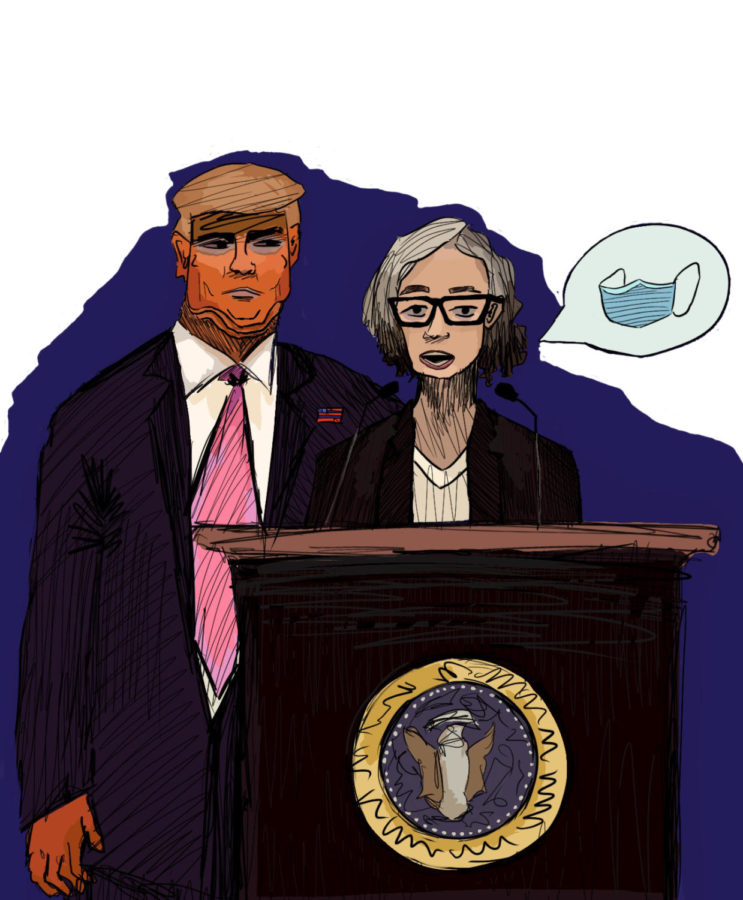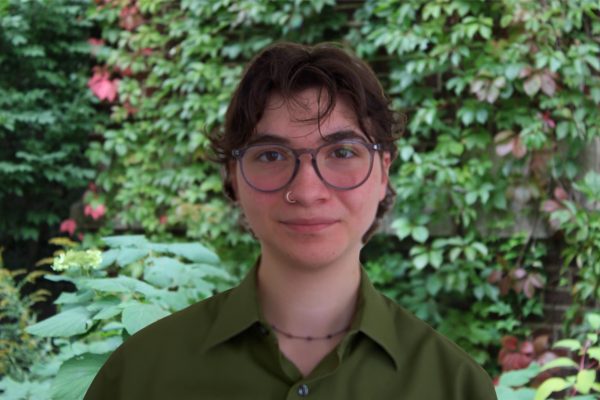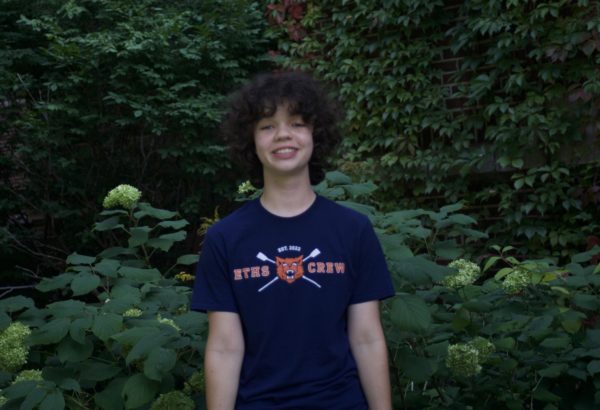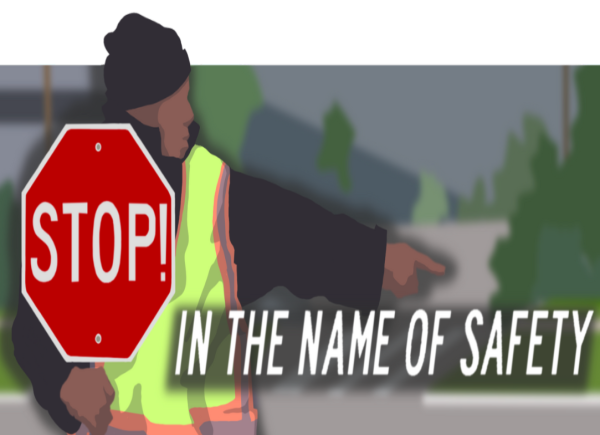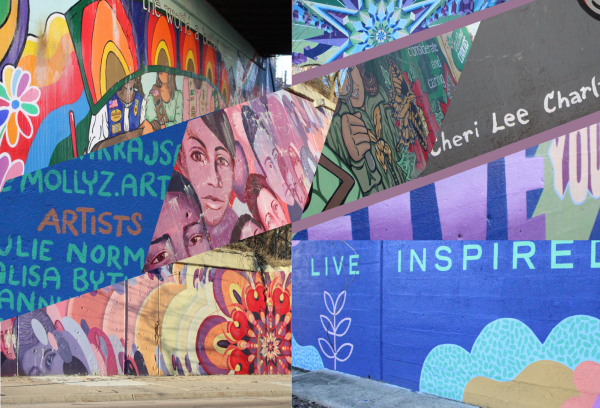The prioritization of politics in a pandemic-riddled world
November 14, 2022
In the early days of the pandemic, it became apparently clear to junior Giles Gilbert Bartell that the media was going to be difficult to trust. Hearing different things from various news outlets, social media platforms, political leaders and his family, there was no one way of determining the truth.
“There was so much information being passed around, any of it could’ve been true or untrue. Typically, I filtered out the most extreme information, but even now I don’t quite know if the information I took for truth actually was,” says Gilbert Bartell.
For many ETHS students and teachers, this was a shared experience, and one that has permanently altered the way they view politics, media, and public health.
In a world where misinformation has the ability to spread like wildfire, it can be difficult to know who to trust. Science has become a topic of debate, health officials the subjects of abuse, and social media a battleground. Even through conflict, the Covid-19 Pandemic has taught us that the truth is inescapable, no matter how grave.
In Cook County alone, almost 40,000 deaths have been recorded since the beginning of the Pandemic, with over 3.79 million confirmed cases of Covid-19. Nationally, there have been over one million deaths, and case numbers are approaching one billion. America is no stranger to loss, yet correspondingly familiar with mistrust in science.
“We so often consume information through [media sources] and look at them as trustworthy places that we can learn about things that are happening in our world. The hope is that our elected officials and news outlets will do their due diligence as they make decisions and report on the news, but unfortunately this is not often the case,” says English teacher Bradley Baum.
“It has become increasingly disappointing that these individuals and sources seem to be more driven by ratings, power, and the money that comes with it rather than reporting the facts,” he continues.
The politicization of science is an issue that public health officials are highly experienced with, from the debunking of political conspiracies to the navigation of a harsh partisan divide found in topics such as public health and pandemic response. For Evanston Health Department Director Greg Olsen, the importance of publicizing the truth in an accessible and dependable way quickly became a primary focus when beginning the pandemic response back in March of 2020.
“We made the decision very early on in the pandemic to be as transparent as we could,” Olsen says. “We know that there was a lot of bad information going out there from the highest office in the country to, you know, your neighbors. We wanted to be a trusted resource for the community.”
In a recent study performed by the Select Subcommittee on the Coronavirus Crisis, a thorough review of the Trump administration’s efforts to interfere with the Pandemic response revealed that the administration was involved in significant harassment of CDC officials, in an attempt to downplay the severity of the virus as well as protect the former President’s reputation. This included a months-long effort against the work and statements made by Dr. Anne Schuchat, former deputy director of the CDC, who retired last spring.
Throughout her 33-year career with the CDC, Dr. Schucat has served a significant role during numerous outbreaks including H1N1, West Nile, Ebola, Zika, and most recently, Covid-19. During the last 5 years of her career, Dr. Schucat was subject to pressure and blame, not only from the Trump administration, but from the public regarding her leadership amid the pandemic.
“The partisan approach that characterizes the Trump administration was really hard. Covid-19 is capable of severe disease, is very transmissible, can cause no symptoms, and could spread before you have any symptoms. It’s a tough virus. And so the partisan effort made it extremely hard to navigate,” said Dr. Schuchat. She continues, “This is the worst virus that I’ve had to deal with, and it’s certainly the worst pandemic that the nation has been through in over 100 years. So, I think every country, every state, every clinician, and every family has really been struggling with it. I think that when we planned for pandemic response, we didn’t expect to have as prolonged responses as we’ve had.”
Starting early on in the Pandemic, it was common to hear about Covid-19 being described as a government hoax, or simply an illness similar to a typical common cold or flu. Worries over the state of the economy overtook broadcast media, and pandemic procedure quickly became a campaign component for both Republicans and Democrats. Tweets from the office of the president read “Don’t be afraid of Covid. Don’t let it dominate your life. We have developed, under the Trump administration, some really great drugs and knowledge,” and “I have always treated the Chinese virus very seriously.”
The Trump administration silenced public health officials like Dr. Schucat, only to take credit for advancements in the prevention and control of the virus, all while bringing race into the national Covid spotlight, ensuing a wave of Asian hate crimes across America. While the rate of reported Asian hate crimes is relatively low in Chicago compared to other cities, the racism associated with Covid-19 is still prevalent.
A study done by Pew Research Center in September 2022 investigated the partisan differences in the lessons taken away from the Covid-19 Pandemic. It was found that those politically aligned with the Democratic Party more frequently reported an increased appreciation for science, specifically on the matter of vaccine development. In contrast, republican identifying individuals were more likely to report distrust in pharmaceutical companies, public health officials, as well as government officials. One study respondent believed that “(Coronavirus vaccines) were hastily made for the sake of profit, not to help or protect American citizens.”
Political and economic perspectives control what media is consumed by citizens, varying the information received during the pandemic. Pew found that over 25% of both democrats and republicans relied on news sources that aligned with their political views during the 2020 election. Similarly, ETHS Senior Rex Wallin consumed media primarily aligned with his and his family’s views throughout the pandemic.
“With the politicization of the pandemic, news sources became very politicized as well, so I generally distrusted news sources that don’t align with my views, like Fox, and trusted sources that do align with my views, especially the New York Times,” says Wallin.
Along with news sources, social media has also been used as a tool for polarization and politicization. While some use it as their main source for information, Physical Education and Sports Medicine teacher Chad Harris has tried to avoid consuming information found on social media.
“Social media was and will always be one of the last sources of information for me. Social media is usually not substantiated by research and involves too much personal bias and conjecture,” says Harris.
While the Evanston and Cook County health departments have delivered consistent, unbiased reports regarding Covid infection rates, vaccines, and lockdown procedures, the media consumed by residents can play a larger role in their perception of these issues.
“Journalism played a really important role in the pandemic,” says Dr. Anne Schuchat. “Often there were conflicting voices of scientists and politicians and various members of the community. And I think journalists try to get the truth…. It’s just very hard right now, with all the different channels and all the different networks that people follow, to have us all be part of the same community.”
Despite the challenges of navigating the political landscape that defined the Pandemic, Dr. Schuchat has found deep value in her public health career.
“It’s incredibly meaningful to do work that challenges you, but also serves others. And there’ll be days and maybe months or years where you wonder, and it seems really, really hard. But when you can do it for a long time, the chance to learn and grow, and see the impact of your work is just extraordinary.”
“There are bad days and good days, it’s not the most highly paid or the high status of many other professions, but for personal meaning, and for working with others that have a shared purpose, it’s really special,” Dr. Schucat expresses.
She continues, “One project after another, one colleague after another, one community after another that I worked with, I found real joy and meaning from that immersion.”
While political leaders disagree on the information regarding Covid-19, public health officials know and share the truth to the extent the Biden administration currently allows. In a highly divided country, it is important to actively seek out the truth and create community rather than polarization, regardless of your political beliefs.
For reliable information regarding Covid-19 on a national level, visit the CDC website. For Evanston-based information, visit the Evanston Health Department’s website through the city of Evanston. Together, we can work to prioritize the lives of our neighbors, and the spread of the truth as we continue to navigate the Covid-19 Pandemic.


